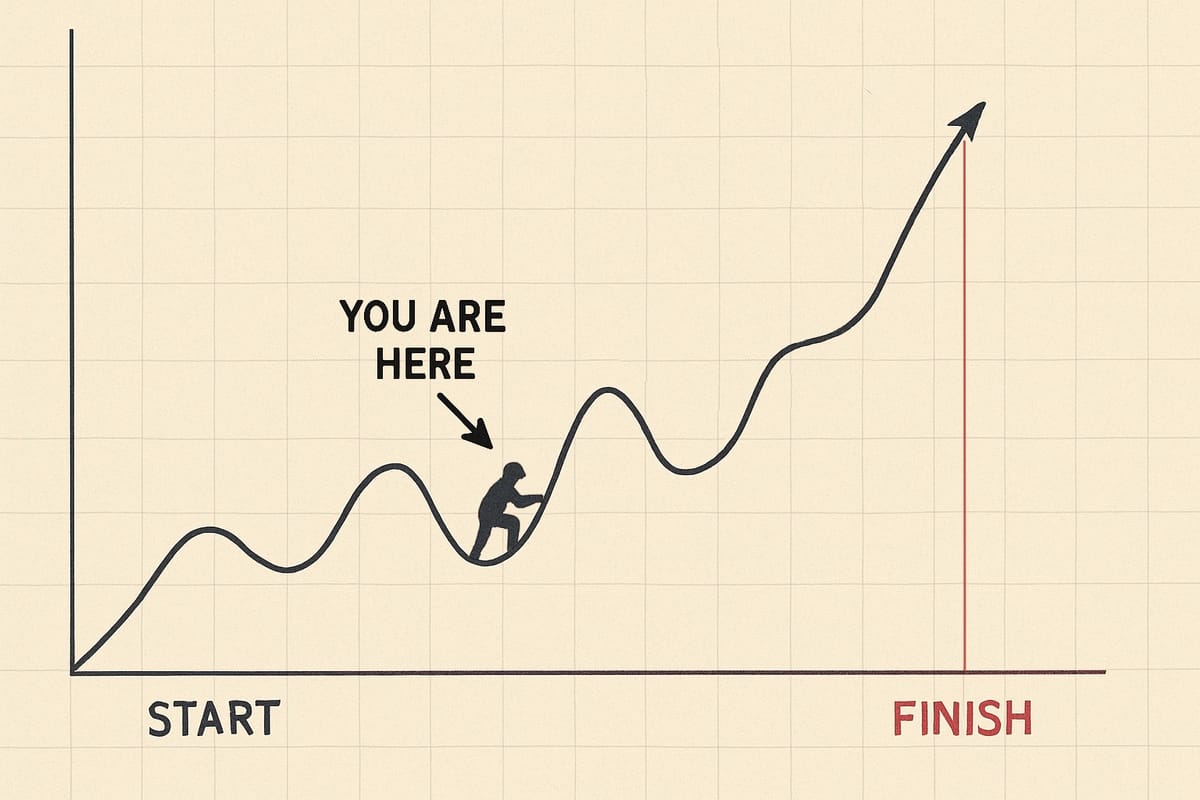How to Finish What You Start: Hack Your Brain to Win
High performers don't just try harder. Learn their secret: redefining 'winning' to overcome unfinished projects and achieve consistent, unstoppable progress.

You aim for audacious goals, driven by a deep desire to succeed.
But despite your grit, do you often find yourself stuck in a cycle of ambitious starts and frustratingly unfinished projects?
The “bad finisher” label probably stings.
What if the most elite achievers don’t just try harder but employ a fundamental, counter intuitive hack to redefine winning itself?
This article reveals their secrets to consistent progress, transforming your shortcomings into unstoppable momentum.
For those who know the sensation, it's a feeling that is all too familiar.
The thing is, the cycle of unfinished goals isn’t a flaw in your ambition or discipline. It stems from a fundamental misunderstanding of what “winning” truly means.
We’ve been conditioned to see success as an all-or-nothing event, tied solely to the distant ultimate objective.
This outdated perspective traps us in a perpetual state of falling short of those exact wins, where every step forward feels like a minor effort rather than a significant gain.
Which ends up draining our motivation and tends to magnify setbacks.
We’re going to expose how this is a flawed operating system. We’ll show you how to hack your brain by redefining what a win truly means, transforming your entire approach to goal achievement.
By generating consistent psychological victories at every step, with this new mindset, you’ll be able to establish such a strong foundation of momentum that’ll propel you through any challenge and ensure you finally finish what you start.
The Flaw of Grandeur
Our struggle to finish ambitious goals often stems from the very nature of those goals. On paper, they appear deceptively straightforward: run a marathon, launch a business, get in shape.
We naively believe it’s simply a matter of continuous upward effort.
We see it as all we have to do is just keep at it, keep on showing up.
What we underestimate is this insidious, cumulative grind required.
We tell ourselves we just need to keep going, to just put in the hours, blinding ourselves to the intricate layers of discipline and persistence that don’t just lead to the end, but allow for genuine pride, free from shortcuts or half measures.
This underestimation, coupled with the grandiosity of our aims, is what creates a profound psychological trap.
You dedicate immense effort, getting so close to the finish line, only to fall short. Or, you achieve it, but with such difficulty that the win feels hollow and unfulfilling.
If it took you a whole day to run a marathon, it might technically feel like completion, but it rarely aligns with the triumph you initially envisioned.
This is the fundamental flaw: our traditional definition of winning is too grand, too distant, and often too vaguely ambiguous.
We envision the final, colossal triumph, and every moment leading up to it feels like a state of not winning.
This constant perception of falling short or barely scraping by is detrimental to success.
It tells your brain you’re not the succeeding type, fostering the very “bad finisher” identity you seek to escape.
The Hack: Redefining Your Wins
Let’s be clear: this isn't about minimizing ambition or lowering expectations to a participation trophy mindset.
We often tend to view any strategic adjustment as a sign of weakness, a shortcut, or a less noble path. A moving of the goal post of sorts.
That ingrained resistance is precisely what sabotages genuine progress. In reality, adapting your scope for winning is the most potent and instinctual method of achievement.
The truth is, our brains already do this by default.
That oversimplification, the “just” we use when confronted with daunting tasks that we mentioned in the previous section, I “just” need to keep going, I “just” need to get through this next bit, this isn't an accident.
It's an innate mechanism to make the overwhelming feel manageable.
The problem isn't “just”; it's applying it incorrectly.
We reduce an incredibly difficult, multi-faceted goal to a single vague instruction, expecting it to carry us to the finish line.
Instead of incorrectly reducing the entire large goal to just a little thing, we need to harness that same mental shorthand and apply it with precision to each layer of the process.
Your “just” is about getting to the next achievable checkpoint, conquering the next immediate hill.
Whether your personal struggle is showing up daily, mastering a new technique or aspect, or pushing through daunting milestones, the just principles applies.
It's about achieving clarity on the next immediate win.
Consider a marathon. On the surface, the idea is you just have to work your way up to running 26.2 miles (42km). But success is built from layers of distinct wins, each requiring unique focus:
- Just Start: Put on your shoes, step out the door.
- Just Keep Going: Consistently show up for the next run, even when tired.
- Just Track Progress: Log your distance or time, assess your strengths and weaknesses.
- Just Learn: Learn from your mistakes, practice your weak spots.
- Just Improve: Commit several runs to refining your form and breathing techniques.
- Just Fuel: Understand nutrition, learn how to better fuel your body, and eat better food.
- Just Rest: Prioritizing good quality sleep.
- Just Upgrade: Research or acquire potential upgrades for more optimal gear.
- Just Commit: Sign up for the race.
- Just Execute: Make it through the grueling 26.2 miles (42km) of the race, acknowledging each mile along the way.
- Just Finish: Finally cross the finish line.
The marathon serves as a powerful analogy due to its universally understood, tangible numbers. This same principle, however, applies to any ambitious goal where progress can be quantified, even if indirectly, whether it’s lines of code written, clients acquired, profit generated, or specific weights lifted in the gym. The key is to establish distinct metrics for your “just” wins, ensuring you have clear data points to assess progression and celebrate legitimate achievements.
When you render the scope of a win to these narrow, immediate chunks, you reprogram your brain.
Finishing a 5k when your goal is a marathon seems like nothing, but rather, you should accept that it’s a solid argument for hitting what could be considered a first checkpoint.
You just need to hit that checkpoint a couple more times.
This allows you to continually pat yourself on the back, not for falling short, but for chipping away at a larger goal.
By leveraging your high achiever mindset, you can turn each completed just and strategically increase it to the next benchmark.
5k this week, 10k next.
Faster next time.
Maybe 15k next, or a faster 5k.
Half-Marathon after that, soon enough longest distance ever.
Then boom, before you know it, Marathon.
By the end, what was once that impossible marathon is behind you, you’ll inevitably ask: That was just a marathon. What can I take on next?
Why the Micro-Wins Lead to Macro-Success
By now, the power of micro-wins should be clear: results are intended to stack.
Progress isn’t a steady, linear ascent; it's a series of ups and downs, but the wins aren’t just about hitting the ultimate finish line.
They are all the critical achievements that happen in between.
For us bad finishers, the very reason we persist in setting new goals, despite past failures, is that the journey was never a total loss.
We stack up countless micro-wins along the way.
Perhaps we didn’t hit the marathon goal, but we absolutely became runners.
The skills acquired, the knowledge gained, the resilience forged in pushing through just one more benchmark, these accomplishments are often as valuable or more so than the final objective itself. Which is a blessing and a curse.
This compounding effect. Each micro-win, no matter how small, acts as a building block.
They accumulate, creating undeniable momentum. This momentum isn’t merely psychological; it makes the larger goal feel genuinely more attainable, less daunting.
Failures shift from being catastrophic defeats to isolated data points, minor detours in a continuous progression of wins.
You learn, you adapt, you reroute, powered by the established rhythm of consistent success.
This process fundamentally rewrites your self-perception, transforming you from someone who falls short into an individual who consistently achieves one deliberate win at a time.



